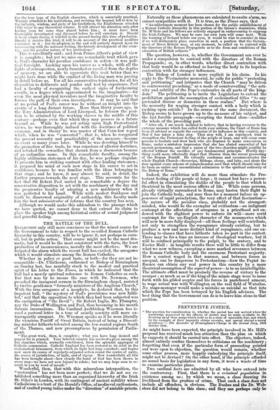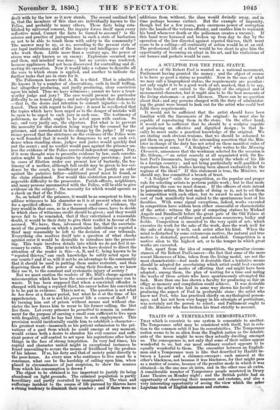PREVENTIVE JUSTICE.
" The question for consideration is, whether the period has not arrived when the knowledge possessed by the officers of justice may be made available to the breaking up of those gangs which hold us in a state of miserable fear, and which by the example of their impunity obtain recruits, and spread abroad a moral pestilence."— The Recorder of Birmingham's Charge to the Grand Jury, lath October 1850.
As might have been expected, the principle involved in Mr. Hill's proposal has received much less attention than the plan on which he suggests it should be carried into effect. The objectors, indeed, almost entirely confine themselves to criticisms on the machinery ; forgetting that even if the particular form of proceeding pointed out were open to objection, the question would remain, whether some other process, more happily embodying the principle itself, might not be devised ? On the other hand, if the principle afforded no sound basis for legislation in any form, it were a waste of time to examine particular plans. Two cardinal facts are admitted by all who have entered into the controversy. First, that there is a criminal population in existence among us ; by which we mean, a class drawing its livelihood from the produce of crime. That such a class does not include all offenders, is obvious. The Rushes and the Dr. Web- sters did not belong to this class; and they can perhaps only be
dealt with by the law as it now stands. The second cardinal fact is, that the members of this class are individually known to the Police, and probably to many others. These facts being esta- blished by universal consent, the inquiry forces itself upon every reflective mind, Cannot the facts be turned to account? is the science and practice of jurisprudence in such a state of barbarism as not to be able to touch them with safety to the community? The answer may be ay, or no, according to the present state of our legal institutions and of the honesty and intelligence of those who work them. Little more than a century ago, the power of steam was only known as an enemy. Explosions occurred now and then, and mischief was done ; but no service was rendered, because appliances had not been discovered for controlling and di- recting its operation. Now it would take a volume to describe all the uses to which steam is applied, and another to indicate the further tasks that are in store for it.
The Policeman knows that A. B. is a thief. That is admitted. He knows it by a number of observations, eahh in itself trifling, but altogether producing, and justly producing, clear conviction upon his mind. Thus we have witnesses : cannot we have a trust- worthy judge and jury? The case would present no particular difficulty to an honest judge ; and nobody pretends that dishonesty —that is, the desire and intention to commit injustice—is to be feared. hen with regard to the jury : it must be recollected that the topics which have been urged as to the danger of mistake will be open to be urged to each jury in each case. The testimony of policemen, no doubt, ought to be acted upon with caution. So say, and very justly say, the objectors. But what is to prevent the necessity for that caution being urged by the counsel for the prisoner, and corroborated in his charge by the judge ? If expe- rience proved that the strictures on the evidence of the Police were so well founded that it would be dangerous to act on such evi- dence when standing alone, judges and juries would quickly find out the secret ; and no verdict would pass against the prisoner un- less the evidence of the Police received independent support. Nay, if it were thought wise to prescribe evidence by law, such corrobo- ration might be made imperative by statutory provision; just as in cases of filiation under our present law of bastardy, the tes- timony of a mother, although full credit may be given to her evi- dence by the court, is insufficient of itself to justify an order against the putative father—additional proof must be found, or the claim abandoned. Nor would this restriction present any in- superable difficulty to the prosecutor. Parish-officers neighbours, and many persons unconnected with the Police, will be able to give evidence on the subject; the necessity for which would operate as a cheek on that of the Police.
So, on behalf of the prisoner, it would be as competent to him to adduce witnesses to his character as it is at present when on trial for a specified offence. If there were a conflict of evidence, the jury would in that case, as in a thousand other cases, have to decide to which class of witnesses credit should be given; and they would never- fail to be reminded, that if they entertained a reasonable doubt, it would be their duty to give their verdict in favour of the accused. We have, then, advanced thus far, that the ascertain- ment of the grounds on which a particular individual is reputed a thief may reasonably be left to the decision of our tribunals. Everything else resolves itself into a question of what checks against error it would be desirable to introduce into the proceed- ing. This topic involves details into which we do not feel it ne- cessary to enter. The point to which we have desired to direct the attention of the reader is this—A, B, and C, being known to be "reputed thieves," can such knowledge be safely acted upon by our courts ? and if so, will it not be an advantage to the community that it should be used in putting them under restraint, and thus depriving them of the power of using their freedom, as we know they use it, to the constant and systematic injury of society ?
But we must caution the readers of Mr. Hill's charge against a misconception which has been the source of much eloquence run to waste. It has been supposed that when a convicted offender is charged with being a reputed thief, his career before his conviction is to be put in evidence. This is not so. The question is not what he has been at a former period, but what he 48 at the time of his apprehension. Is or is not his present life a course of theft ? If by turning him out of prison without means and without cha- racter the law forces him to recur to his former milling, the blot lies there. Let every prisoner be permitted to remain in confine- ment for the purpose of earning a small sum sufficient to live upon with frugality, until he has had time to seek employment. This provision would incidentally enable him to establish a character— his greatest want—inasmuch as his patient submission to the pri- vations of a gaol from which he could emerge at any moment, would evince both a desire to abandon his evil courses and suffi- cient power of self-control to act upon his aspirations after better things in the face of strong temptation. In very bad times, his capital and character united might in exceptional instances be found unavailing to secure the means of livelihood by the produce of his labour. If so, his duty and that of society point directly to the poor-house. As every man who continues to live must be a consumer, what can be the hardship. of calling upon him, when placed in circumstances of just suspicion, to show the sources from which his consumption is drawn ? The object to be obtained is too important to justify its being abandoned on light grounds. The criminal population is partly hereditary and partly recruited by immigrants.' The vices and sufferings incident to the course of life pursued by thieves have a strong tendency to diminish their number ; and if there were no additions from without, the class would dwindle away, and in time perhaps become extinct. But the example of impunity, though but for a few years, puts enormous power of corruption into the hands of the veteran offender, and enables him to replenish his band whenever death or the policeman creates a vacancy. If this band were harassed and broken up from day to day by the operation of the law directed against reputed thieves, theft must cease to be a calling—all continuity of action would be at an end. The professional life of a thief would be too short to give him the opportunity of becoming an adept in his art, and his visitations of our houses and pockets would be rare.



























 Previous page
Previous page